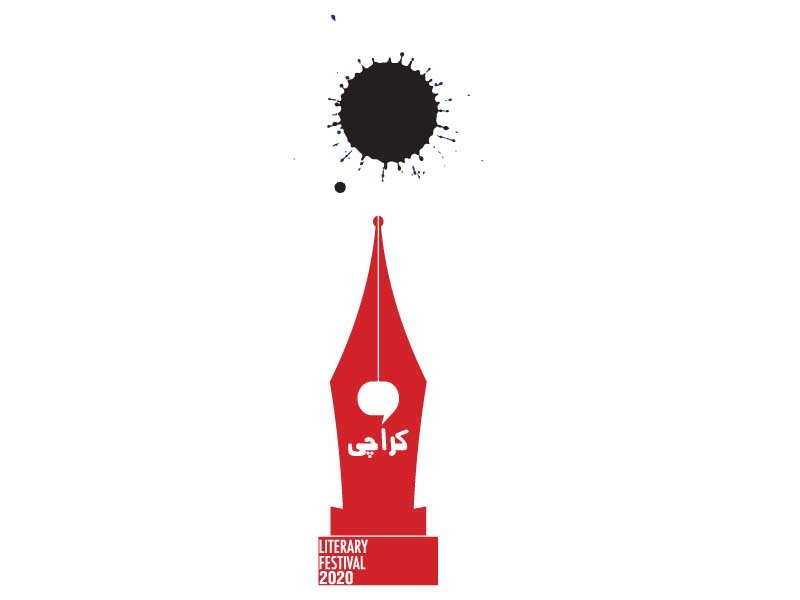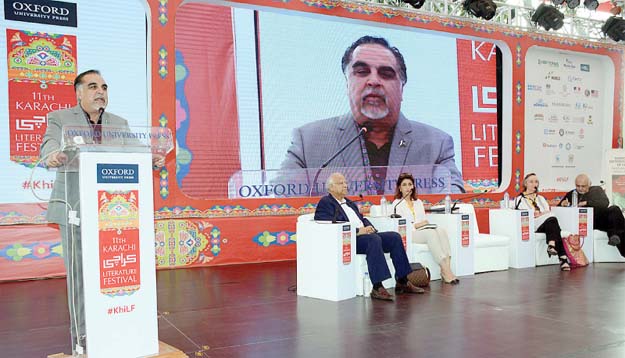
These were the questions posited by Dr Huma Baqai, the associate dean at IBA Karachi's social sciences department, as she moderated a session titled 'Blood over Different Shades of Green: East Pakistan 1971, History Revisited' at the Karachi Literature Festival (KLF) on Saturday. "When will we dare to speak complete truths?" she asked.
Kickstarting the discussion, Sindh Governor Imran Ismail stressed that the aim was to prevent history from repeating itself in any way. Referring to the war in Afghanistan, which dragged on for 18 long years leading to nothing but devastation, he quoted Prime Minister Imran Khan, saying, "War is and never was a solution."
He lauded the festival's organisers for opening the floor to such discourses, which take us back to the miscalculations that are impacting the nation to date, and offered the Governor House as a venue for the next edition of the KLF.
 Sindh Governor Imran Ismail and other speakers at KLF discuss reasons that led to the creation of Bangladesh and stressed not to repeat the mistakes of the past. PHOTO: APP
Sindh Governor Imran Ismail and other speakers at KLF discuss reasons that led to the creation of Bangladesh and stressed not to repeat the mistakes of the past. PHOTO: APPHistorian Dr Bettina Robotka, who is one of the co-authors of the book under discussion at the panel - Blood over Different Shades of Green - explained that when we have too much information, we miss out on what is most important. With the war of 1971, she maintained, our sources for learning about history should have been speeches and the hands-on experiences of witnesses, rather than textbooks and faltering facts that brushed the reality under the carpet.
"The past is over but will hound us forever," she claimed, adding that the war had begun long before 1971, with economic disparity, conflict over culture and language, and attempts to dominate a nation known for their pride and self-esteem - the Bengalis.
"No institution, no ethnic group holds the right to define or dictate the essence of nationalism or national security for the entire nation," asserted journalist Haider Mehdi, reading an excerpt from the book. "There should be no such entitlement for anyone," he declared.
Terming the elections of 1954 as the turning point in history, Ikram Sehgal, the other co-author of the book, maintained that the war in 1971 was just the last part of the long-building aggression in the corridors of power. "Too little and too late were our measures to curtail the damage we had unknowingly done. The horses had already bolted," he stated, adding that the bitter war had not just divided Pakistan but also families, generations and narratives.
Stressing that the war was not just a military defeat, Dr Baqai pointed out that it was also a diplomatic downfall with our inability to plead our case on the international stage, a failure for the media in portraying the reality of the war, and an overall loss for society.
Concluding the session, Dr Robotka underlined that one of the biggest problems, both today and back then, was that those in charge have always tried to induce uniformity among people. "Unity is diversity. Differences are meant to be celebrated."
Published in The Express Tribune, March 1st, 2020.

1732569774-0/Baymax-(2)1732569774-0-165x106.webp)















COMMENTS
Comments are moderated and generally will be posted if they are on-topic and not abusive.
For more information, please see our Comments FAQ